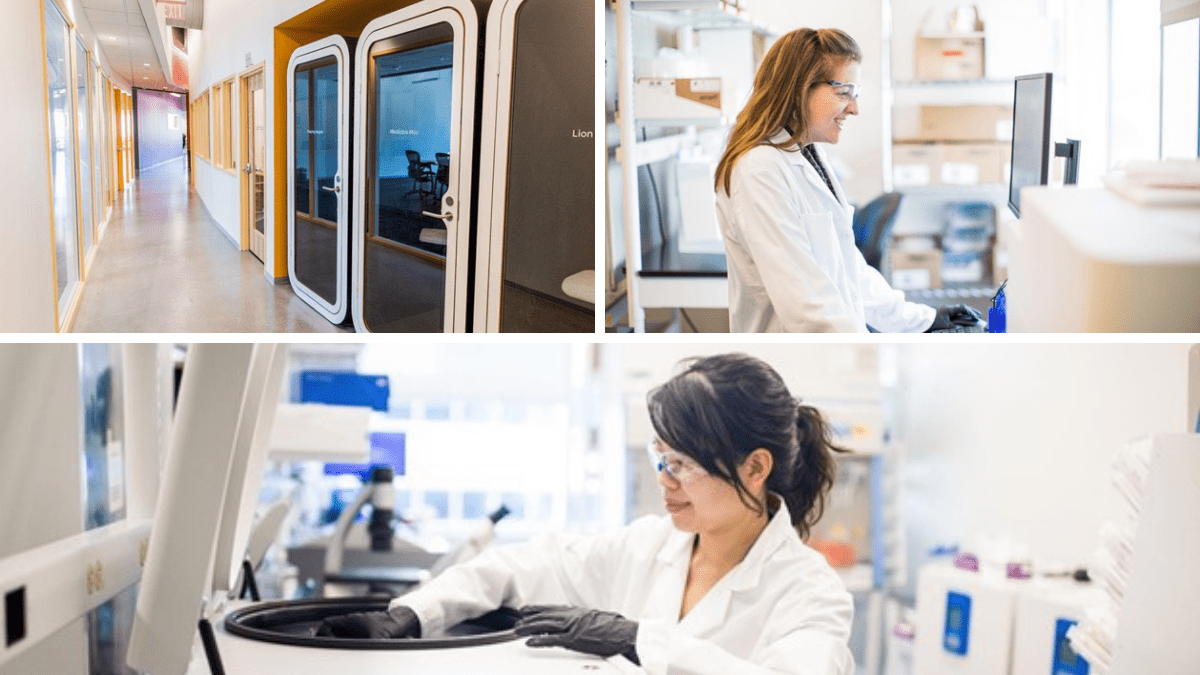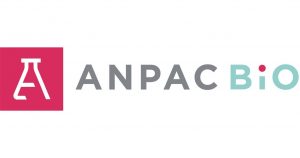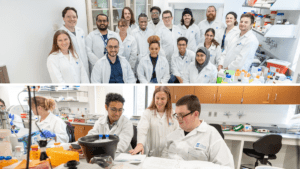
CIC Set to Double Lab Benches as uCity Square Also Expands
A new expansion will make CIC Philadelphia in uCity Square, Philadelphia, the largest commercial lab hub in the United States. Slated to complete later this year, the expansion will double the number of benches in CIC from 200 to over 400, said Michelle Ottey, Ph.D., managing director of CIC.
CIC currently occupies floors 2, 3, 5, 6, 7, and 8 of 3675 Market Street, owned and developed by Wexford Science + Technology, a leading developer of “knowledge communities,” including uCity Square. Floors 3 and 7 are being renovated from more traditional coworking and office spaces into wet lab space to help meet the demand CIC and greater Philadelphia has seen in recent years. However, CIC also serves non-life science clients and will still offer traditional office and coworking space.
“We have waitlists. Our current smaller clients, who are growing, are ready to take on more space,” Ottey explains. “We have constant inquiries coming in from all over the city and outside of the city, within the ecosystem and outside. There’s a huge, huge demand for space and you can see that.”
CIC’s wet lab spaces are full-service, meaning they offer clients shared amenities such as office equipment like copy machines and printers, as well as lab supplies such as pipettes, freezers, and a lab coat cleaning service. Sharing amenities helps start-ups save on some of the high-cost items they would usually have to invest in themselves and helps them get right to work.
CIC caters to start-up companies that are too big for or have outgrown incubator spaces. The Innovation Center at 3401 Market Street, just down the street from CIC, acts more as an incubator space and bridge for university students.
Companies can also rent out benches in a shared lab space or rent out their own wet labs of various sizes. Life science companies can also take advantage of CIC’s shared offices and coworking spaces.
“It’s when you’ve got some funding and you’re able to take on some individual benches, either in a shared lab space or individual labs, that you would come into the CIC space,” Ottey shares. “And we really do work with the companies to help them grow and scale. So eventually the goal is to have them graduate into their own spaces.”
Wexford is also expanding uCity Square this year, beyond the CIC expansion. A district in the larger University City neighborhood, uCity Square spans from 34th to 38th Streets and from Market Street to Lancaster Avenue. Wexford plans to add 1 million square feet, 400,000 of which will be lab space in the form of a 14-story high-rise spec building called One uCity. Century Therapeutics and Integral Molecular have already signed on as tenants.
“[Building spec] is a big milestone for the market … it’s usually the bigger markets like Boston, San Diego, or San Francisco where people have more routinely built speculatively to try and get ahead of that constraint,” said John Grady, Senior Vice President and Northeast Region Executive at Wexford. “We were really the first ones to do that here in Philadelphia and it’s allowed us to kind of stay ahead of the market.”
Wexford will also deliver a 500,000-square-foot building for Drexel University. Drexel will use it as its Health Sciences Building to help consolidate all of its medical education into one central campus instead of having buildings scattered across the city as they currently are.
The last new building Wexford will deliver is 3700 Lancaster, a 460-unit apartment building designed for professional students and young professionals.
“Adding residential units allows us to build more amenity space — particularly food and beverage-based — create a better quality of living and continuing to reinforce the quality of life for talent that’s being attracted in the district,” Grady said.
Quality of talent in the University City neighborhood is one of its primary draws, says Grady. Because both Drexel and UPenn are located in University City, there’s a wide array of new graduates and professional students in the area for companies to hire.
Additionally, the neighborhood is well-situated transit-wise, with access to the SEPTA Regional Rail, subway system, and trolley lines.
CIC also works directly with the University City neighborhood, supporting social efforts such as Coded by Kids and Black and Brown Coders. Ottey hopes to bring in a diverse group of start-ups when the new benches become available.
“We want to give opportunities to underrepresented populations, so really focusing on that is part of the mission. It’s part of what we’d like to do,” Ottey explained. “And there’s just so much potential in this area. We want to help to discover and develop that.”






